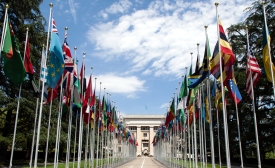digital diplomacy
Social media giant Facebook revealed Tuesday the most talked about topics of 2014 around the world with the main topic the World Cup. Other topics in the list included the Gaza conflict, the Ice Bucket Challenge, the Ebola Virus as well as Sochi Winter Olympics.

Syracuse University Association of Public Diplomacy Scholars recently published the 2014 Exchange Journal of Public Diplomacy, “Public Diplomacy in Emerging Nations.” This issue aims to observe public diplomacy from a non-American perspective and through comparative studies sheds light on how PD is practiced in Mexico, Russia, India, Turkey, and China.
This map tracks mentions of the hashtags #TortureReport and #CIAReport immediately before and after the release of US Senate inquiry into interrogation techniques used by the CIA.
While Jordan has made public its participation in US-led air strikes against ISIL in Syria, it has launched a quieter war at home, as authorities crack down on social media users and religious leaders who allegedly promote "terrorist ideology".
Support is mounting for a Medal of Honor recipient who is threatening terrorists on Twitter after the FBI warned soldiers to lie low on social media. Dakota Meyer, who served in the Marines for four years, is trying to make the point that he doesn't want to live in fear because of ISIS, he told ABC News today.
“Bermuda has been a little bit forgotten,” said Victoria Isley, the chief marketing and sales officer of the Bermuda Tourism Authority, who took the post in April after leading Destination Marketing Association International, a trade association. To do so, the island is turning to where travelers increasingly learn about destinations: social media
The Federal Bureau of Investigation and the Department of Homeland Security this weekend jointly issued the strongest warning yet for U.S. servicemen to scrub their accounts on Facebook, Twitter and other social media.
Last Wednesday, Canada officially launched its national Twitter accounts in French and English as part of an integrated diplomacy strategy. (...) It wasn’t long before the first wave of criticism appeared. Not over anything related to international diplomacy. Rather — because this is Canada — the brouhaha was over language.







